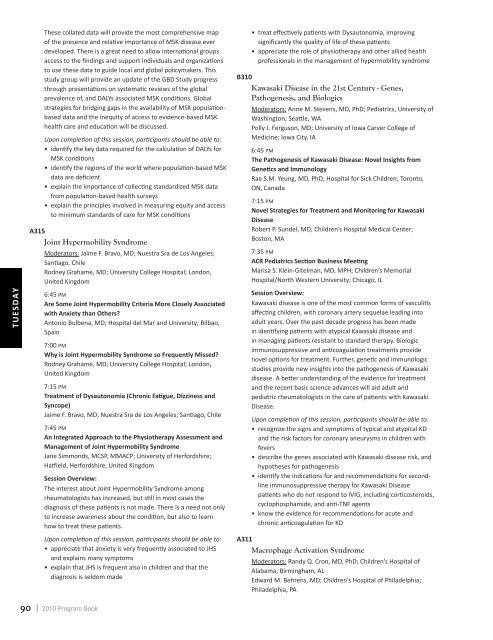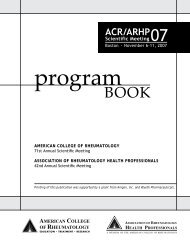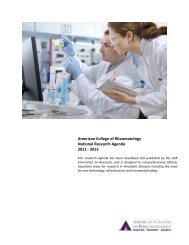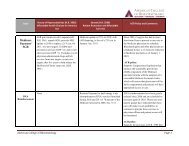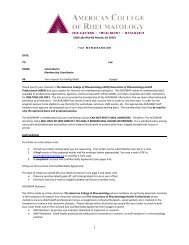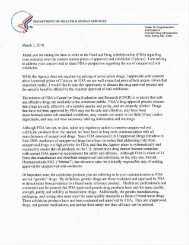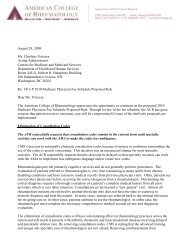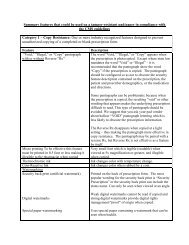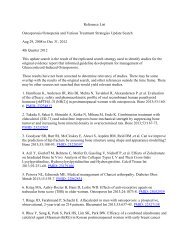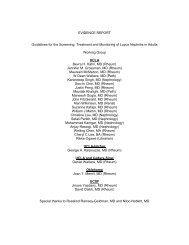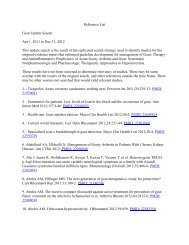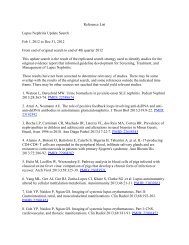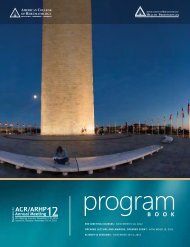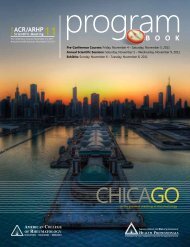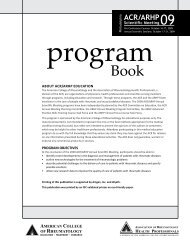B O O K - American College of Rheumatology
B O O K - American College of Rheumatology
B O O K - American College of Rheumatology
You also want an ePaper? Increase the reach of your titles
YUMPU automatically turns print PDFs into web optimized ePapers that Google loves.
tuesday<br />
These collated data will provide the most comprehensive map<br />
<strong>of</strong> the presence and relative importance <strong>of</strong> MSK disease ever<br />
developed. There is a great need to allow international groups<br />
access to the findings and support individuals and organizations<br />
to use these data to guide local and global policymakers. This<br />
study group will provide an update <strong>of</strong> the GBD Study progress<br />
through presentations on systematic reviews <strong>of</strong> the global<br />
prevalence <strong>of</strong>, and DALYs associated MSK conditions. Global<br />
strategies for bridging gaps in the availability <strong>of</strong> MSK populationbased<br />
data and the inequity <strong>of</strong> access to evidence-based MSK<br />
health care and education will be discussed.<br />
Upon completion <strong>of</strong> this session, participants should be able to:<br />
• identify the key data required for the calculation <strong>of</strong> DALYs for<br />
MSK conditions<br />
• identify the regions <strong>of</strong> the world where population-based MSK<br />
data are deficient<br />
• explain the importance <strong>of</strong> collecting standardized MSK data<br />
from population-based health surveys<br />
• explain the principles involved in measuring equity and access<br />
to minimum standards <strong>of</strong> care for MSK conditions<br />
A315<br />
Joint Hypermobility Syndrome<br />
Moderators: Jaime F. Bravo, MD; Nuestra Sra de Los Angeles;<br />
Santiago, Chile<br />
Rodney Grahame, MD; University <strong>College</strong> Hospital; London,<br />
United Kingdom<br />
6:45 PM<br />
Are Some Joint Hypermobility Criteria More Closely Associated<br />
with Anxiety than Others?<br />
Antonio Bulbena, MD; Hospital del Mar and University; Bilbao,<br />
Spain<br />
7:00 PM<br />
Why is Joint Hypermobility Syndrome so Frequently Missed?<br />
Rodney Grahame, MD; University <strong>College</strong> Hospital; London,<br />
United Kingdom<br />
7:15 PM<br />
Treatment <strong>of</strong> Dysautonomia (Chronic Fatigue, Dizziness and<br />
Syncope)<br />
Jaime F. Bravo, MD; Nuestra Sra de Los Angeles; Santiago, Chile<br />
7:45 PM<br />
An Integrated Approach to the Physiotherapy Assessment and<br />
Management <strong>of</strong> Joint Hypermobility Syndrome<br />
Jane Simmonds, MCSP, MMACP; University <strong>of</strong> Herfordshire;<br />
Hatfield, Herfordshire, United Kingdom<br />
Session Overview:<br />
The interest about Joint Hypermobility Syndrome among<br />
rheumatologists has increased, but still in most cases the<br />
diagnosis <strong>of</strong> these patients is not made. There is a need not only<br />
to increase awareness about the condition, but also to learn<br />
how to treat these patients.<br />
Upon completion <strong>of</strong> this session, participants should be able to:<br />
• appreciate that anxiety is very frequently associated to JHS<br />
and explains many symptoms<br />
• explain that JHS is frequent also in children and that the<br />
diagnosis is seldom made<br />
• treat effectively patients with Dysautonomia, improving<br />
significantly the quality <strong>of</strong> life <strong>of</strong> these patients<br />
• appreciate the role <strong>of</strong> physiotherapy and other allied health<br />
pr<strong>of</strong>essionals in the management <strong>of</strong> hypermobility syndrome<br />
B310<br />
Kawasaki Disease in the 21st Century - Genes,<br />
Pathogenesis, and Biologics<br />
Moderators: Anne M. Stevens, MD, PhD; Pediatrics, University <strong>of</strong><br />
Washington; Seattle, WA<br />
Polly J. Ferguson, MD; University <strong>of</strong> Iowa Carver <strong>College</strong> <strong>of</strong><br />
Medicine; Iowa City, IA<br />
6:45 PM<br />
The Pathogenesis <strong>of</strong> Kawasaki Disease: Novel Insights from<br />
Genetics and Immunology<br />
Rae S.M. Yeung, MD, PhD; Hospital for Sick Children; Toronto,<br />
ON, Canada<br />
7:15 PM<br />
Novel Strategies for Treatment and Monitoring for Kawasaki<br />
Disease<br />
Robert P. Sundel, MD; Children’s Hospital Medical Center;<br />
Boston, MA<br />
7:35 PM<br />
ACR Pediatrics Section Business Meeting<br />
Marisa S. Klein-Gitelman, MD, MPH; Children’s Memorial<br />
Hospital/North Western University; Chicago, IL<br />
Session Overview:<br />
Kawasaki disease is one <strong>of</strong> the most common forms <strong>of</strong> vasculitis<br />
affecting children, with coronary artery sequelae leading into<br />
adult years. Over the past decade progress has been made<br />
in identifying patients with atypical Kawasaki disease and<br />
in managing patients resistant to standard therapy. Biologic<br />
immunosuppressive and anticoagulation treatments provide<br />
novel options for treatment. Further, genetic and immunologic<br />
studies provide new insights into the pathogenesis <strong>of</strong> Kawasaki<br />
disease. A better understanding <strong>of</strong> the evidence for treatment<br />
and the recent basic science advances will aid adult and<br />
pediatric rheumatologists in the care <strong>of</strong> patients with Kawasaki<br />
Disease.<br />
Upon completion <strong>of</strong> this session, participants should be able to:<br />
• recognize the signs and symptoms <strong>of</strong> typical and atypical KD<br />
and the risk factors for coronary aneurysms in children with<br />
fevers<br />
• describe the genes associated with Kawasaki disease risk, and<br />
hypotheses for pathogenesis<br />
• identify the indications for and recommendations for secondline<br />
immunosuppressive therapy for Kawasaki Disease<br />
patients who do not respond to IVIG, including corticosteroids,<br />
cyclophosphamide, and anti-TNF agents<br />
• know the evidence for recommendations for acute and<br />
chronic anticoagulation for KD<br />
A311<br />
Macrophage Activation Syndrome<br />
Moderators: Randy Q. Cron, MD, PhD; Children’s Hospital <strong>of</strong><br />
Alabama; Birmingham, AL<br />
Edward M. Behrens, MD; Children’s Hospital <strong>of</strong> Philadelphia;<br />
Philadelphia, PA<br />
90<br />
2010 Program Book


